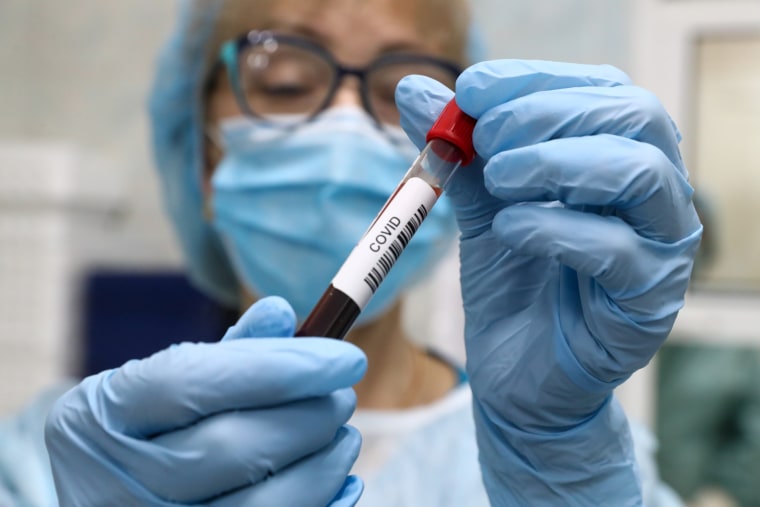Recent studies have suggested that people's blood types may affect their risk of contracting the COVID-19 virus or developing a serious case of the disease. Overall, the findings indicate that people with Type O blood seem to be more protected and that those with Type A appear more vulnerable.
So does that mean some people can slack off on preventive measures while others need to ratchet them up?
Not so fast, say doctors who point out that the findings show associations, not causation — and don't indicate that any particular blood type guarantees protection.
While the findings may catch the public's attention at a time when people fatigued by the pandemic are looking for signs of hope, doctors say the results are more relevant to researchers trying to better understand the virus.
"I think something like this has much more sex appeal than it does real practical value," said Dr. Aaron Glatt, chair of medicine and chief of infectious diseases at Mount Sinai South Nassau in New York.
Everybody should practice exactly the same way, whatever your blood type is, in terms of appropriate masking and social distancing.
Any possible influence of blood type on COVID-19 appears small compared with the substantial impact of known risk factors, such as older age and underlying health conditions, said Glatt, who is a spokesperson for the Infectious Diseases Society of America. "In any individual patient, if they have risk factors or they don't have risk factors, that is far, far more important," he said.
People shouldn't jump to conclusions that they are safer or not because of their blood types, he said.
"They certainly shouldn't walk around high-fiving and saying, 'I can do whatever I want, I don't have to mask, I don't have to worry about anything because I have O,'" Glatt said. "And they shouldn't crawl into a corner of the world and not let anyone near them because they have A. Everybody should practice exactly the same way, whatever your blood type is, in terms of appropriate masking and social distancing."
Full coverage of the coronavirus outbreak
Dr. Lewis Kaplan, a professor of surgery at the University of Pennsylvania who is president of the Society of Critical Care Medicine, agreed.
Even if some people have reduced risks based on blood type — and the risks vary by study — they don't have zero risk, Kaplan said. "It might mean they have less risk, but if you engage in risky behavior, we don't know just how much risk you need to incur to overwhelm whatever potential protection you might have," he said. "We have no clue."
A European study published last month in the New England Journal of Medicine found that people with Type A blood were 45 percent more likely to develop severe COVID-19 requiring oxygen supplementation or a ventilator than people with other blood types and that those with Type O blood were 35 percent less likely. The study involved 1,610 patients with severe COVID-19 and 2,205 control subjects.
But people with Type O can still get very sick.
"They have a decreased risk to get infected and to develop severe disease," study author Andre Franke, a professor of molecular medicine at the University of Kiel in Germany, said in an email. "However, this is only a relative risk reduction, i.e. there is no full protection. Among our patients who died there were also many with blood group O."
A couple of related papers have been released on the preprint server medRxiv without the peer review scrutiny that published papers typically receive. Studies in China and New York both found that people with Type A blood had a greater risk of coronavirus infection than those with other blood types, while those with Type O had a lower risk.
And the gene testing company 23andMe wrote a blog post about preliminary unpublished data suggesting that people with Type O blood were less likely to test positive for the coronavirus than others.
Dr. Roy Silverstein, a professor and chair of medicine at the Medical College of Wisconsin who is senior investigator at Versiti Blood Center of Wisconsin, cautioned against putting too much weight on findings that haven't been peer-reviewed and said more research is needed.
"We have to be careful about overreacting," Silverstein said.
Download the NBC News app for full coverage and alerts about the coronavirus outbreak
Blood types O and A are most common, so the studies were able to draw stronger statistical conclusions about those types than B and AB, he said.
An explanation for the findings isn't known, but there is speculation that blood type may affect clotting or other factors in COVID-19 patients or somehow affect infectivity or immunity. The hope is that the findings can be applied to future research to better understand why the coronavirus affects people differently and to develop treatments.
The results aren't expected to alter how doctors care for patients now.
"The fact that you have O or A is not going to change one iota how we monitor a patient," said Glatt, of Mount Sinai South Nassau. "If somebody has O and they're not doing well, I'm not going to say, 'Oh, don't worry about it, you have O.' I would treat them appropriately. And if they have A and they're doing very well, I would say, 'OK, we're going to continue to watch you.'"
